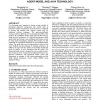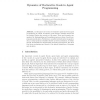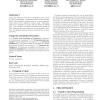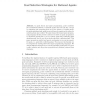138
click to vote
CATA
2003
15 years 3 months ago
2003
It is becoming more important to design systems capable of performing high-level management and control tasks in interactive dynamic environments. At the same time, it is difficul...
143
click to vote
DALT
2008
Springer
15 years 3 months ago
2008
Springer
The core capability of a rational agent is to choose its next action in a rational fashion, a capability that can be put to good use by a designer to satisfy the design objectives ...
133
click to vote
ATAL
2006
Springer
15 years 5 months ago
2006
Springer
Modularization is widely recognized as a central issue in software engineering. In this paper we address the issue of modularization in cognitive agent programming languages. We d...
126
click to vote
ECAI
2004
Springer
15 years 7 months ago
2004
Springer
We present the agent programming language GTGolog, which integrates explicit agent programming in Golog with gametheoretic multi-agent planning in Markov games. It is a generalizat...
123
click to vote
DALT
2004
Springer
15 years 7 months ago
2004
Springer
In this paper, the notion of declarative goals as used in agent programming is central. Declarative goals describe desirable states and are updated during the execution of an agent...
111
click to vote
ATAL
2004
Springer
15 years 7 months ago
2004
Springer
Most existing work in agent programming assumes an execution model where an agent has a knowledge base (KB) about the current state of the world, and makes decisions about what to ...
123
click to vote
ATAL
2005
Springer
15 years 7 months ago
2005
Springer
This paper addresses the notion of declarative goals as used in agent programming. Declarative goals describe desirable states, and semantics of these goals in an agent programmin...
114
click to vote
ATAL
2005
Springer
15 years 7 months ago
2005
Springer
We present the agent programming language POGTGolog, which combines explicit agent programming in Golog with game-theoretic multi-agent planning in a special kind of partially obs...
117
click to vote
PROMAS
2007
Springer
15 years 8 months ago
2007
Springer
Modular programming has the usual benefits associated with structured programming, information hiding and reusability, but also has additional benefits to offer when applied in ...
116
click to vote
LADS
2007
Springer
15 years 8 months ago
2007
Springer
In agent theory and agent programming, goals constitute the motivational attitude of rational agents and form the key concept in explaining and generating their pro-active behavior...




